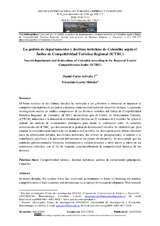Mostrar el registro sencillo del ítem
La gestión de departamentos y destinos turísticos de Colombia según el Índice de Competitividad Turística Regional (ICTRC)
| dc.contributor.author | Corzo Arévalo, Daniel | |
| dc.contributor.author | García Méndez, Sebastián | |
| dc.date.accessioned | 2021-01-12T12:31:15Z | |
| dc.date.available | 2021-01-12T12:31:15Z | |
| dc.date.issued | 2020 | |
| dc.identifier.issn | 2530-7134 | |
| dc.identifier.uri | http://hdl.handle.net/10396/20962 | |
| dc.description.abstract | El boom turístico de las últimas décadas ha motivado a los gobiernos a enfocarse en impulsar la competitividad turística de sus países y destinos, como un catalizador del desarrollo humano. La presente investigación realiza un análisis comparativo de las diversas variables del Índice de Competitividad Turística Regional de Colombia (ICTRC) desarrollado por el Centro de Pensamiento Turístico (CPTUR), inherentes a la dimensión de Gestión del Destino en 22 territorios de Colombia. Se aplicó el método del análisis de componentes principales para medir la correlación entre 18 variables seleccionadas del ICTRC, que dan cuenta de la gestión de destinos en Colombia. Se identificó que, para mejorar la competitividad turística de los destinos en Colombia, los focos principales deben orientarse hacia la información turística, los eventos terroristas, los niveles de presupuestales, el retorno a la contribución parafiscal y la inclusión del turismo en los planes de desarrollo. Se recomienda que las entidades gubernamentales formulen, implementen y validen procesos a nivel macro y micro en los constructos referidos, con el fin de impactar considerablemente la competitividad turística de los destinos. | es_ES |
| dc.description.abstract | In recent decades, the tourism boom has motivated governments to focus on boosting the tourism competitiveness of their countries and destinations, as a catalyst for human development. This research performs a comparative analysis of the various variables from the Regional Tourism Competitiveness Index of Colombia (ICTRC), developed by the Centre for Tourism Thinking (CPTUR), within the Destination Management dimension in 22 departments of Colombia. The principal components analysis method was applied to measure the correlation between 18 variables selected from the ICTRC, which provide a measurable account of the efficacy of destination management in Colombia. It was identified that, to improve tourist destination competitiveness in Colombia, the main focus should be on tourist information, terrorist events, budget levels, the return to the parafiscal contribution and the inclusion of tourism in development plans. It is recommended that government entities formulate, implement and validate processes at the macro and micro level in the aforementioned constructs, in order to considerably impact tourist destination competitiveness. | es_ES |
| dc.format.mimetype | application/pdf | es_ES |
| dc.language.iso | spa | es_ES |
| dc.publisher | UCOPress | es_ES |
| dc.rights | https://creativecommons.org/licenses/by-nc/4.0/ | es_ES |
| dc.source | Revista Internacional de Turismo, Empresa y Territorio (RITUREM) 4(2), 158-177 (2020) | es_ES |
| dc.subject | Competitividad turística | es_ES |
| dc.subject | Destinos turísticos | es_ES |
| dc.subject | Análisis de componentes principales | es_ES |
| dc.subject | Colombia | es_ES |
| dc.subject | Tourist competitiveness | es_ES |
| dc.subject | Touristic destinations | es_ES |
| dc.subject | Principal component analysis | es_ES |
| dc.title | La gestión de departamentos y destinos turísticos de Colombia según el Índice de Competitividad Turística Regional (ICTRC) | es_ES |
| dc.title.alternative | Tourist departments and destinations of Colombia according to the Regional Tourist Competitiveness Index (ICTRC) | es_ES |
| dc.type | info:eu-repo/semantics/article | es_ES |
| dc.relation.publisherversion | http://www.uco.es/ucopress/ojs/index.php/riturem/index | es_ES |
| dc.rights.accessRights | info:eu-repo/semantics/openAccess | es_ES |

